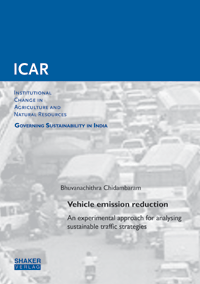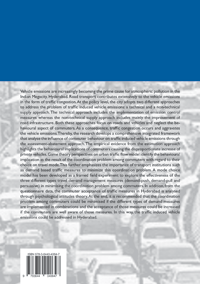
Shop : Details
Shop
Details
28,00 €ISBN 978-3-8440-4064-7Softcover272 pages55 figures408 g21 x 14,8 cmEnglishThesis
December 2015
Bhuvanachithra Chidambaram
Vehicle emission reduction
An experimental approach for analysing sustainable traffic strategies
Vehicle emissions are increasingly becoming the prime cause for atmospheric pollution in the Indian Megacity, Hyderabad. Road transport contributes extensively to the vehicle emissions in the form of traffic congestion. At the policy level, the city adopts two different approaches to address the problem of traffic induced vehicle emissions: a technical and a non-technical supply approach. The technical approach includes the implementation of emission control measures whereas the non-technical supply approach includes mainly the improvement of road infrastructure. Both these approaches focus on roads and vehicles and neglect the behavioural aspect of commuters. As a consequence, traffic congestion occurs and aggravates the vehicle emissions. Thereby, the research develops a comprehensive integrated framework that analyse the influence of commuter behaviour on traffic induced vehicle emissions through the assessment-abatement approach. The empirical evidence from the estimation approach highlights the behavioural implications of commuters causing the disproportionate increase of private vehicles. Game theory perspectives on urban traffic flow model identify the behavioural implication as the result of the coordination problem among commuters with regard to their choice on travel mode. This further emphasizes the importance of transport institutions such as demand based traffic measures to minimize this coordination problem. A mode choice model has been developed as a framed field experiment to explore the effectiveness of the three different types travel demand management measures (demand-push, demand-pull and persuasive) in minimising the coordination problem among commuters. In addition, from the questionnaire data, the commuter acceptance of traffic measures in Hyderabad is analysed through psychological attitudes theory. At the end, it is recommended that the coordination problem among commuters could be minimised if the different types of demand measures are implemented in combinations and the acceptance of those measures could be increased if the commuters are well aware of those measures. In this way, the traffic induced vehicle emissions could be addressed in Hyderabad.
Keywords: Institutional Economics; Sustainable traffic strategies; Vehicle emission reduction; Comprehensive Integrate Framework; Traffic pollution assessment; Institutional Analysis; Vehicle emission analysis; Traffic congestion; Resource economics; Environment; Sustainability; Policy planning; Pollution abatement; Vehicle emissions; Traffic and Transport
Institutioneller Wandel der Landwirtschaft und Ressourcennutzung - Institutional Change in Agriculture and Natural Resources
Edited by Prof. Dr. Volker Beckmann and Prof. Dr. Konrad Hagedorn, Greifswald und Berlin
Volume 60
Available online documents for this title
You need Adobe Reader, to view these files. Here you will find a little help and information for downloading the PDF files.
Please note that the online documents cannot be printed or edited.
Please also see further information at: Help and Information.
Please also see further information at: Help and Information.
| Document |  | Document | ||
| Type |  | |||
| Costs |  | 21,00 € | ||
| Action |  | Purchase in obligation and download the file | ||
| Document |  | Table of contents | ||
| Type |  | |||
| Costs |  | free | ||
| Action |  | Download the file | ||
User settings for registered online customers (online documents)
You can change your address details here and access documents you have already ordered.
User
Not logged in
Export of bibliographic data
Shaker Verlag GmbH
Am Langen Graben 15a
52353 Düren
Germany
Am Langen Graben 15a
52353 Düren
Germany
Mon. - Thurs. 8:00 a.m. to 4:00 p.m.
Fri. 8:00 a.m. to 3:00 p.m.
Fri. 8:00 a.m. to 3:00 p.m.
Contact us. We will be happy to help you.



